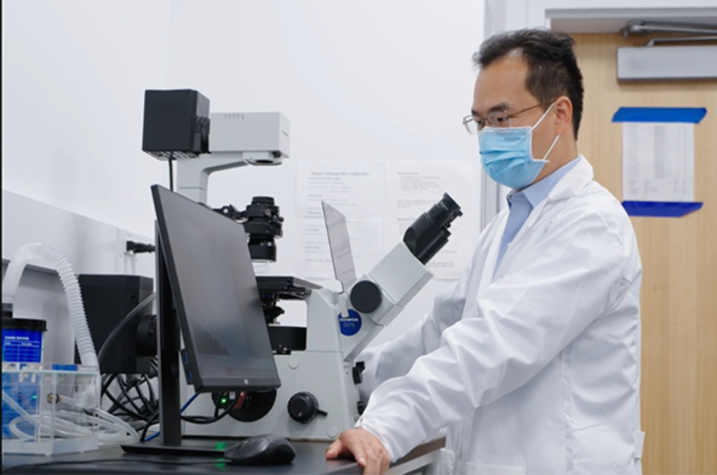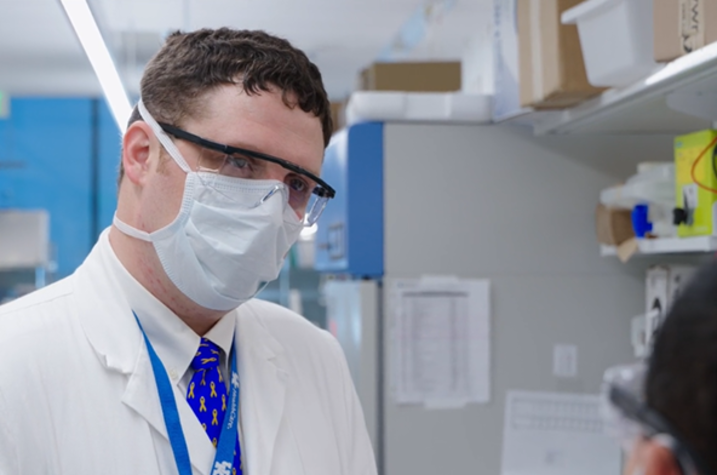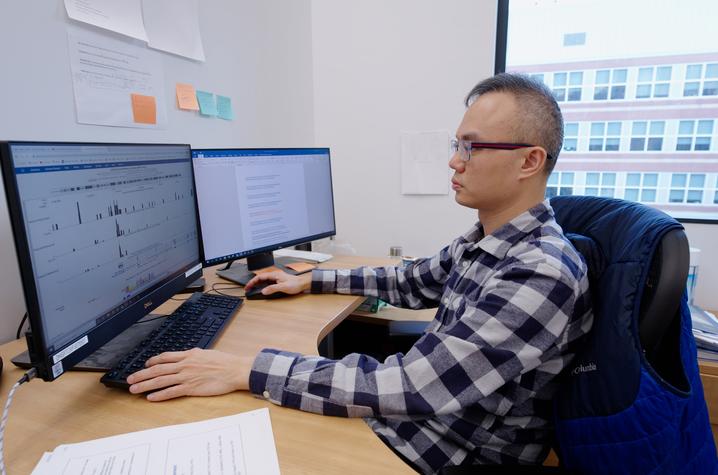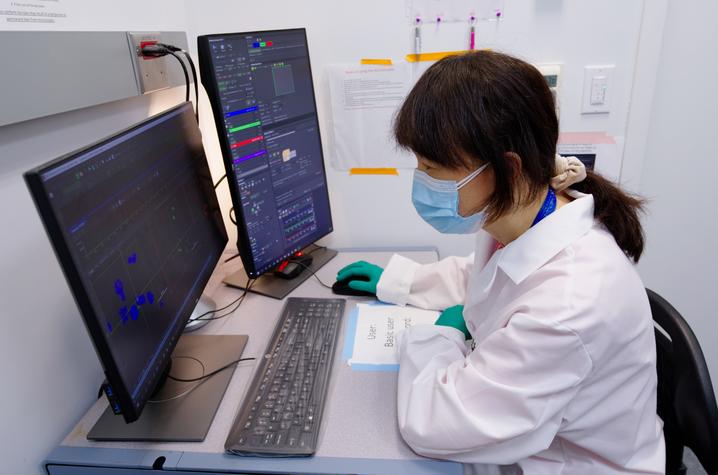UK Receives Renewed $11.4 Million Grant to Further Cancer Research
Video produced by UK Research Communications. To view captions for this video, push play and click on the CC icon in the bottom right hand corner of the screen. If using a mobile device, click on the "thought bubble" in the same area.
LEXINGTON, Ky. (May 25, 2022) — The University of Kentucky’s Center for Cancer and Metabolism (CCM) will continue its critical mission to research the metabolism of cancer with a renewed Centers of Biomedical Research Excellence (COBRE) grant award from the National Institutes of General Medical Sciences, part of the National Institutes of Health.
The prestigious grant — totaling $11.4 million — will continue to fund UK’s CCM over the next five years.
The CCM was established in March 2017 with an initial $11.2 million NIH grant and is led by a multidisciplinary team of basic and clinical scientists engaged in cutting-edge research on metabolic dysregulation in cancer, an emerging hallmark of disease responsible for tumor development, drug resistance and distant metastasis.
The first COBRE grant award allowed the next generation of scientists to address this major health threat in the nation. The second phase will build upon these accomplishments to propel CCM to a nationally recognized center in cancer and metabolism research that will also address the region’s critical needs.
Kentucky has disproportionately high incidences of both cancer and metabolic disorders and leads the nation in cancer deaths and is in the top 10 for highest obesity rates in the country. While scientists have long known of a direct link between obesity and cancer, the need for further research into this field is a necessity for Kentuckians.
The scientific discoveries achieved through the CCM will continue to help the UK Markey Cancer Center in its mission to “Conquer Cancer in the Commonwealth.” As Markey prepares to renew its National Cancer Institute Cancer Center designation, and simultaneously compete to become a Comprehensive Cancer Center, Markey Director Mark Evers, M.D., emphasizes the need for increased cancer research funding and continuing to push for new discoveries.
“The field of cancer research has never been more exciting,” Evers said. “Nearly every week, there are new discoveries that are saving lives. This funding will allow us to translate more of these findings into potential new therapies for cancer patients from Kentucky and beyond.”
UK’s CCM capitalizes on highly specialized institutional strengths in cancer and advanced metabolomics tools to focus on the underlying mechanisms that link dysfunctional metabolism to cancer. The goal of the second phase of the CCM is to continue efforts to conduct high-quality basic and translational research to expand a thematically focused multidisciplinary infrastructure dedicated to defining the contribution of metabolism in the development and treatment of cancer, and to use this novel multidisciplinary platform to develop promising project leaders with enhanced skills in an exciting new area of cancer research.
UK has internationally renowned experts in the field of cancer and metabolism, and new state-of-the-art technology has improved the ability to understand how metabolism impacts cancer.
The COBRE grants use this platform to develop promising early-stage investigators with enhanced skill sets in exciting new areas of cancer research and to enhance their success in competing for NIH grant support. The grant promotes collaborative, interactive efforts among researchers with complementary backgrounds, skills and expertise.
Four junior investigators, mentored by teams of clinicians and scientists from a variety of disciplines, departments and colleges at UK, will lead major projects investigating an aspect of cancer metabolism:
- “Circulating tumor cell-neutrophil clusters in breast cancer metastasis,” led by Xia Liu, Ph.D., Department of Toxicology and Cancer Biology, UK College of Medicine;
- “An intra-vital metabolic microscope to reveal the mechanisms of radiation resistance in head and neck carcinomas,” led by Caigang Zhu, Ph.D., Department of Biomedical Engineering, UK College of Engineering;
- “TRIM28 fuels prostate cancer growth through SETDB1-mediated epigenetic silencing of androgen metabolic genes UGT2B15 and UGT2B17,” led by Will Fong, Ph.D., Department of Toxicology and Cancer Biology, UK College of Medicine; and
- “Targeting Glutamine Uptake via ASCT2 Inhibition in MYCN-amplified Neuroblastomas,” led by Eric Rellinger, M.D., Division of Pediatric Surgery, UK College of Medicine.
“Many of these junior investigators need a platform and a lab to exercise their dream in cancer research,” said Peter Zhou, M.D., Ph.D., professor in the UK Department of Molecular and Cellular Biochemistry. “The COBRE program provides this really unique platform that gives them the salary support and additional money to recruit students and postdocs, as well as basic science and clinical mentors to help foster their career development.”
Zhou co-leads the CCM with program director Daret St. Clair, Ph.D., professor in the Department of Toxicology and Cancer Biology and the James Graham Brown Foundation Endowed Chair in Neuroscience.
“Collaboration and a supportive environment is key to our success with this grant, and we hope to continue expanding on that throughout the life of this center,” St. Clair said. “We are able to recruit top-tier researchers who want to make UK their home because of the value we place on multidisciplinary research, which enables them to become the new project leaders and carry on this important work that we are doing.”
Research reported in this publication was supported by the National Institute of General Medical Sciences of the National Institutes of Health under Award Number P20GM121327. The content is solely the responsibility of the authors and does not necessarily represent the official views of the National Institutes of Health.




As the state’s flagship, land-grant institution, the University of Kentucky exists to advance the Commonwealth. We do that by preparing the next generation of leaders — placing students at the heart of everything we do — and transforming the lives of Kentuckians through education, research and creative work, service and health care. We pride ourselves on being a catalyst for breakthroughs and a force for healing, a place where ingenuity unfolds. It's all made possible by our people — visionaries, disruptors and pioneers — who make up 200 academic programs, a $476.5 million research and development enterprise and a world-class medical center, all on one campus.




